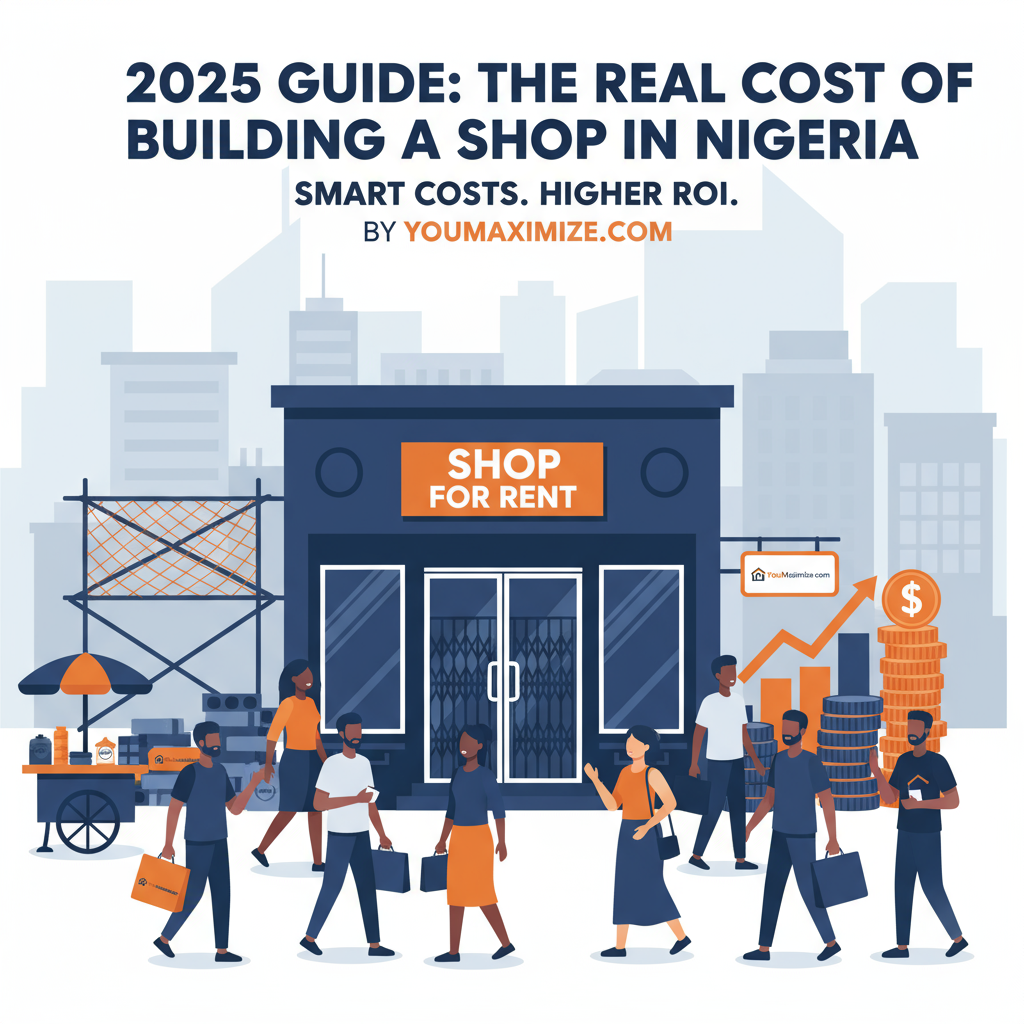Nigeria’s retail landscape in 2025 is booming, with a population of over 230 million (more than half in urban areas) fueling demand for small retail spaces. From bustling city markets to neighborhood streets, small shops (often around 12ft × 12ft in size) remain the backbone of commerce. It’s common to see landlords converting the front of fenced residential properties into rows of shops, or developers adding retail units to capitalize on this demand.
These modest shops – whether standalone kiosks or part of a strip mall – are an attractive investment because they cater to Nigeria’s vast informal retail sector, which accounts for roughly 90% of retail transactions. In short, building a standard shop can be a profitable venture – but how much does it actually cost in 2025? Let’s dive into a detailed breakdown and smart strategies to maximize your return on investment (ROI).
Why Investing in Retail Shops Makes Sense
Strong Demand & Stable Income
Small shops are consistently in demand by traders and small business owners. Even as malls and e-commerce grow, roadside stores and open markets remain dominant. A single 12×12 ft shop in a busy market can rent for about ₦250,000–₦500,000 per year, with tenants often pre-paying 2–3 years upfront. This ensures steady rental income.
Attractive ROI
Compared to residential rentals, retail shops often deliver competitive rental yields of 8–12% annually. For example, if you build a shop for ₦3 million and rent it for ₦300,000 a year, that’s a 10% yield – with potential to recoup costs in as little as 5–8 years while property values appreciate.
Resilience and Low Default Rates
Tenants’ livelihoods depend on their shops, so rent defaults are rare. With millions of potential tenants across Nigeria, vacancy periods are usually short if your shop is in a good location.
Market Trends Favor Retail Spaces
Rapid urbanization, new housing estates, and transport hubs are spurring demand for shops. Even during downturns, people still need everyday goods, keeping small retail spaces relevant.
Cost Breakdown of Building a Standard Shop
Building a standard 12ft × 12ft shop in 2025 involves these stages:
- Land Preparation & Approvals: ₦200,000–₦600,000 for site prep, permits, and basic fencing.
- Foundation: ₦300,000–₦600,000 depending on soil conditions.
- Wall Construction: ₦400,000–₦800,000 for blocks, cement, and masonry.
- Roofing: ₦200,000–₦400,000 depending on materials.
- Finishing (Flooring, Plastering, Painting): ₦400,000–₦800,000.
- Doors & Windows: ₦70,000–₦150,000 for secure fittings.
- Electrical & Miscellaneous: ₦100,000–₦200,000.
- Labor Costs: ₦600,000–₦1,000,000 depending on duration and crew size.
Total Estimated Cost: ₦2.5 – ₦3.5 million for basic finishes (excluding land). With premium materials, this can rise to ₦4 – ₦5 million.
Regional Price Variations
| Location | Estimated Total Cost (2025) | Notes |
|---|---|---|
| Lagos (High-cost Urban) | ₦2.5M – ₦3.5M (basic) Up to ₦5.0M (modern finish) | High demand, costly permits, higher labor/material prices |
| Abuja (High-cost Urban) | ₦2.3M – ₦3.5M | Slightly lower in outskirts |
| Port Harcourt (Urban) | ₦2.4M – ₦3.5M | Costs vary by terrain (swampy areas = higher foundation costs) |
| Enugu / Kano (Mid-size City) | ₦2.0M – ₦3.0M | Lower labor & land costs compared to Lagos/Abuja |
| Semi-Urban / Rural Towns | ₦1.5M – ₦2.5M | Cheaper land & labor, but logistics may add costs |
Tips to Minimize Costs Without Sacrificing Quality
- Use locally sourced materials.
- Build multiple shops in a row to share walls and reduce cost.
- Buy materials in bulk for discounts.
- Keep the design simple and functional.
- Manage labor efficiently and hire skilled workers.
- Reuse/recycle materials where possible.
- Design for ventilation and natural light to save energy.
Expected Rental Yield & Payback
- Typical Rental Rates: ₦250k–₦500k/year in major cities; ₦60k–₦180k/year in smaller towns.
- Rental Yield: 8–15% depending on location.
- Payback Period: 5–10 years, shorter if tenants pay multiple years upfront.
- Long-Term Gains: Property value appreciation boosts ROI further.
Conclusion
Building a standard shop in Nigeria in 2025 requires an upfront investment of ₦2.5–₦3.5 million (excluding land), but the returns can be strong if you choose the right location and manage costs wisely. Shops provide steady income, strong yields, and long-term appreciation.
Treat it as more than construction – it’s a business investment. Maintain your property, support tenants, and keep learning from the market. Done right, a single shop can be the foundation of sustainable passive income and future real estate ventures.




